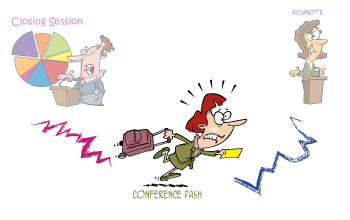 I love attending conferences, and I have attended a bunch in the past few years, including a couple as a “reporter” for TechWhirl (LavaCon 2011 and 2012). Although the majority relate to technical writing, or at least have a general information orientation (InfoCamp Berkeley 2011, for example), I take every chance to attend conferences on other subjects too. A now-forgotten speaker once said that he likes to attend conferences in areas unrelated to his own; he gave an accidental attendance at a conference about canning as an example of how hearing about different subjects can trigger your creativity.
I love attending conferences, and I have attended a bunch in the past few years, including a couple as a “reporter” for TechWhirl (LavaCon 2011 and 2012). Although the majority relate to technical writing, or at least have a general information orientation (InfoCamp Berkeley 2011, for example), I take every chance to attend conferences on other subjects too. A now-forgotten speaker once said that he likes to attend conferences in areas unrelated to his own; he gave an accidental attendance at a conference about canning as an example of how hearing about different subjects can trigger your creativity.
With that in mind, I am reporting back on two conferences I attended in Vancouver in March 2014: Incredible Machines and BIL.
Incredible Machines 2014
Incredible Machines 2014, a 1.5-day inaugural event held in Vancouver, might even skirt the edge of the technical writing field, as its focus was the philosophy of computing, or more generally, “The diverse range of subjects of interest to Incredible Machines can perhaps best be understood by looking at what is posted on its Facebook page:
Full disclosure, I did not get to see the whole conference, as I took off halfway through the second day for another event. But I think I attended enough to form an opinion. The fact that the conference was free might reduce commitment, but it definitely makes it easier to come, even apart from the savings.
Many of the speakers at Incredible Machines are known only within rather narrow academic circles, but at least two, Benjamin Bratton and Alexander Galloway, are relatively well-known. (Some of the others are likely quite well-known too, but my knowledge of current academic thinkers is more limited than I would like.)
Benjamin Bratton
Benjamin Bratton is probably best known for his recent attack on the concept of TED, which, ironically, he presented at a TEDx San Diego talk (so, yes, he made his case against TED using the TED format). But you can read the transcript of this talk here.
Much of what Bratton says regarding TED resonates with me. Some subjects cannot, and should not, be simplified to fit into the confines of a TED talk. Or, if they are simplified for this purpose, the viewer should avoid the conceit of having become an instant expert. It is indeed frustrating to think that an astrophysicist, as Bratton describes, is told to make her presentation more Malcolm-Gladwell-like (and that the view in many circles is that much of what Malcolm Gladwell writes is simplistic, inaccurate, and often not based on much of anything). See:
So knowing Bratton’s bias upfront, I was curious how he would handle a non-TED talk of 20-30 minutes length. He discussed his idea of how cloud computing (which he calls planetary computation) undermines national sovereignty, as well as other implications of planetary computation.
Although Bratton was more comprehensible than many of the other academic speakers, I was continually running after him mentally (you can probably guess why if you read the talk). A sentence like this offends all of the ideas that we hold dear as technical writers:
“Today, as the nomos that was defined by the horizontal loop geometry of the modern state system creaks and groans, and as “Seeing like a State” takes leave of that initial territorial nest—both with and against the demands of planetary-scale computation—we wrestle with the irregular abstractions of information, time, and territory, and the chaotic de-lamination of (practical) sovereignty from the occupation of place.”
But to paraphrase, using Bratton’s terms, planetary computation threatens the concepts of Westphalian geography and sovereignty that have been the bedrock of Western thinking for the past 350 or more years. You can familiarize yourself with the Thirty Years War, the Peace of Westphalia, and the underlying theories of nationalism that arose from that peace in this Wikipedia article.
Bratton also sees Westphalian geography as being analogous to a horizontal loop, and planetary computation as a vertical, layered stack, with both geometries either aware or unaware of each other at different times.
I have such mixed feelings about academic writing of this sort. Is there ever a place for such complexity? It’s true that Bratton eschews tying up the subject in a tidy bow, unlike many TED talks. Is clear writing always our desired aim? Is Bratton’s non-TED talk more informative and useful than a TED talk on the same subject?
You can make your own judgment, and if you prefer a print version of his talk here visit http://www.e-flux.com/journal/the-black-stack/
Bratton also has a book coming out soon on these topics.
Alexander Galloway
Alexander Galloway, the keynote speaker on Friday night, managed great clarity while discussing very complex subjects. His talk was “The Black Box of Philosophy: Compression and Obfuscation.”
Galloway is fascinated by the idea of the “black box” and compression. His discussion of lossy and lossless compression was technically adept and thoughtful. Although it is not in the least like a textbook description, it was informative. What is the philosophical implication of lossy compression? By compression, we do not attempt to faithfully reproduce the image or sound, but to discard parts of it.
Compression is necessary for any sort of explanation. To paraphrase Grigory Chaitin, a well-known mathematician and computer scientist,
a theory, an explanation, is only successful to the extent that it compresses the bits in the facts to a much smaller number of bits in the theory. Understanding is compression.
This idea makes sense. Consider that if you have a theory, it takes an untidy mass of facts, and summarizes them in a neat and elegant way. And, if you are interested in this fascinating subject, look up algorithmic information theory.
Galloway is very interested in the French philosopher François Laruelle, who is difficult to summarize. Once again, I recommend Wikipedia to get a start on Laruelle’s work and the concept of non-philosophy. Then, Galloway turned to Heidegger and Deleuze, and rather than summarize, I will direct you to the video to watch and then do further research.
In the back of my mind, except for speakers like Galloway (who has a background as a computer programmer in addition to academia), I wondered if the speakers actually had clear ideas about software development, cloud computing, and related topics. Perhaps some of the obscurity related to lack of knowledge? But that is just an idle thought as an open question, and not intended to promulgate prejudices against humanities scholars (the split between arts and sciences has always seemed wrong to me).
In fact, some speakers threw up so much jargon at a breakneck speed that it was impossible to decode what they were saying. I wonder if the audience should perhaps be expected to read the speakers’ articles in advance?
Incredible Machines 2014 was a conference for academics, particularly humanities scholars interested in the implications of current computing technologies. It succeeded in that milieu, but taking its concepts to a wider audience, if anyone is interested in doing so, will require a careful reinterpretation and indeed translation of the presentations.
BIL Unconference 2014
 Later in March, the BIL Unconference came to Vancouver. BIL runs in tandem with TED, and was started by a separate group that wanted a more inclusive option for people who probably were not attending TED. Whereas TED has registration fees in the range of $7000 per person, and you have to undergo an application process, BIL is open to all by donation. Following typical unconference practices, the talks were organized earlier in the day as the speakers came forward to suggest talks. I did not attend most of the talks due to other obligations, but people talked about everything from Bitcoin to Keystone XL to storytelling to building a lunar elevator.
Later in March, the BIL Unconference came to Vancouver. BIL runs in tandem with TED, and was started by a separate group that wanted a more inclusive option for people who probably were not attending TED. Whereas TED has registration fees in the range of $7000 per person, and you have to undergo an application process, BIL is open to all by donation. Following typical unconference practices, the talks were organized earlier in the day as the speakers came forward to suggest talks. I did not attend most of the talks due to other obligations, but people talked about everything from Bitcoin to Keystone XL to storytelling to building a lunar elevator.
You can see a list of speakers and their talks here.
I did love the talk on building a lunar elevator, given by Michael Laine, CEO of Liftport Group.
Among other memorable aspects, I learned that if Liftport’s idea is implemented, it would put a counterweight in space, and there’s a minute chance that the cord holding the counterweight could snap, which would cause the weight to free-fall to earth and precipitate an event similar to the meteorite impact 65 million years ago, with rather dire consequences for some species. Remember, there’s a difference between “difficult”, “very hard”, and “impossible”. And, yes, I think Laine’s talk qualifies as technical communication. He was an engaging speaker who made us care about this rather hard-to-believe idea (or dream).
You can find more on the proposed construction in this Space article.
And, lucky us, Amanda Palmer and Neil Gaiman, having attended TED a few days prior, decided to pay us at BIL Unconference a surprise visit, which was quite delightful. Admittedly, my daughter would have been more enraptured to see Amanda Palmer than I, but I enjoyed hearing her thoughts about technologies that would enable online busking; about the importance of making art even if you do not see yourself as an artist; and a her singing and ukulele playing Neil Gaiman talked about his collaboration with Blackberry, who paid for him to do any type of fiction he wanted to do. He read one of the stories he had written and reminisced about touching book tours and where young women come with battered copies of Coraline (a horror story written by Gaiman) and tell him how the story had helped them through very difficult, sometimes abusive situations.
If you are interested in BIL, just follow where TED is, and BIL will probably follow. And you can check out their website to learn about the many volunteers who make it happen.
I was very interested to read Scott Berkun, an author and thinker in the user experience space in particular, talk about how to get more out of conferences.
Whether you are going to a professional conference like the STC Summit, or an unconference about animal rights (yes, it exists), the person who is most in control of learning from a conference is you. We all love to hear inspirational speakers, but you are the one who has to discuss the sessions with other attendees, read material before and after, follow up with well-reasoned questions, and apply what you have learned.
Some other inexpensive conferences I recommend for a different take on tech comm and information:
- Write The Docs (currently Portland, OR and Budapest): http://conf.writethedocs.org
- InfoCamp (various cities): Google is your best bet, as some sites are out of date.
I would love to hear about what conferences you are attending and what you’ve gotten from them. Start a discussion in the comments section below.